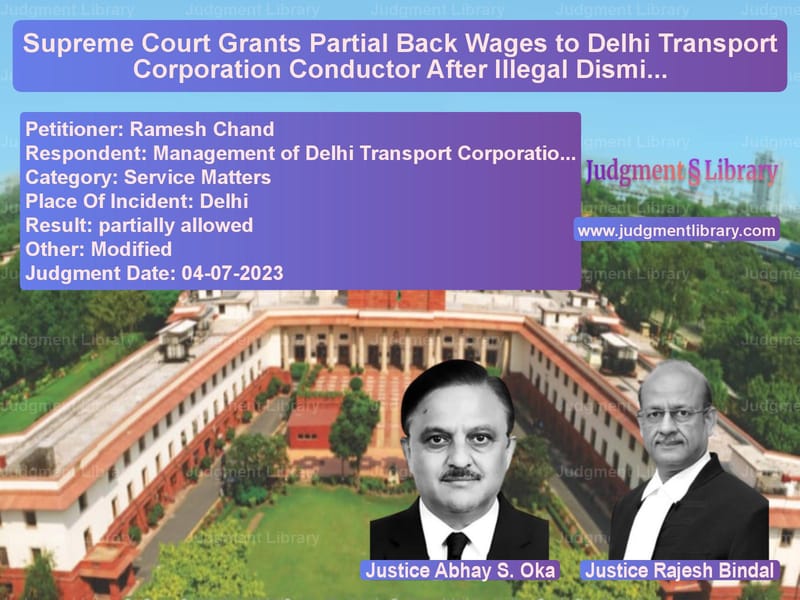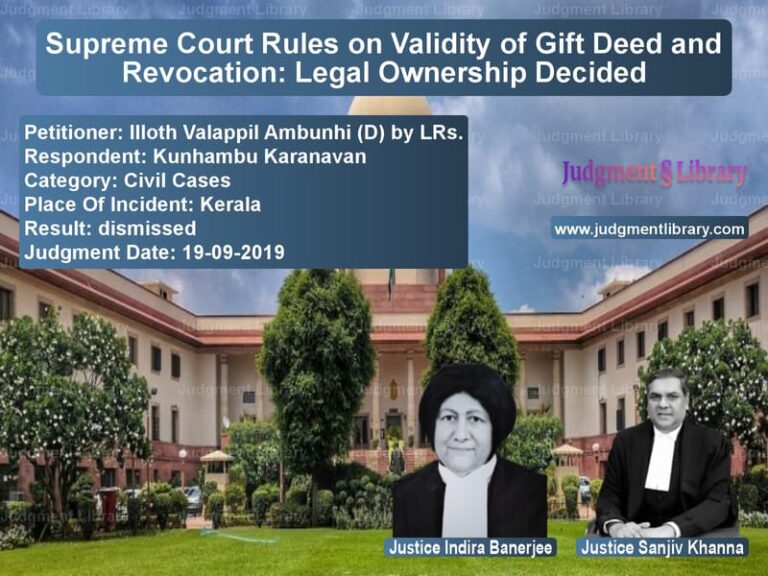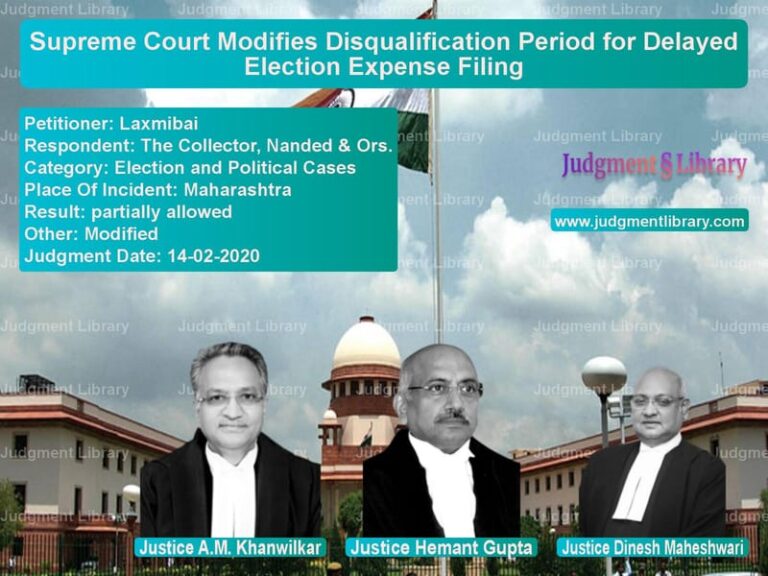Supreme Court Grants Partial Back Wages to Delhi Transport Corporation Conductor After Illegal Dismissal
The case of Ramesh Chand v. Management of Delhi Transport Corporation revolves around the wrongful dismissal of a bus conductor accused of ticket fraud. The Supreme Court upheld his reinstatement but awarded partial back wages instead of full compensation, emphasizing the burden of proof on employees in such cases.
Background of the Case
The appellant, Ramesh Chand, was employed as a bus conductor by the Delhi Transport Corporation (DTC) on June 22, 1985. The controversy began when he was accused of misconduct on duty.
Key Events Leading to Litigation
- September 8, 1992: Ramesh Chand was served with a charge sheet for allegedly collecting Rs. 4 from two passengers but failing to issue tickets.
- June 14, 1996: Following an internal inquiry, the DTC removed him from service.
- 1997: Ramesh Chand challenged his termination by raising an industrial dispute before the Labour Court.
- March 17, 2009: The Labour Court ruled that the DTC had failed to establish the charge and ordered his reinstatement but denied back wages.
- July 23, 2009: Ramesh Chand was reinstated.
- March 31, 2020: He retired from service.
- 2015: Dissatisfied with the denial of back wages, Ramesh Chand filed a writ petition before the Delhi High Court, which was dismissed.
- December 11, 2015: A Division Bench of the High Court upheld the ruling.
- July 5, 2023: The Supreme Court granted partial back wages of Rs. 3 lakhs.
Arguments Before the Supreme Court
Appellant’s Arguments
Ramesh Chand, represented by senior counsel, argued that:
- He was unemployed from the date of his removal until his reinstatement.
- The Labour Court wrongly denied back wages despite ruling in his favor.
- He had no alternative source of income and faced financial hardship.
- The principle of full back wages after illegal termination should apply.
Respondent’s Arguments (Delhi Transport Corporation)
The DTC, represented by its counsel, countered that:
- Ramesh Chand failed to prove his unemployment during the period of termination.
- His earlier affidavit claiming unemployment was withdrawn and replaced with a new one lacking this assertion.
- Full back wages should not be granted without concrete evidence of financial hardship.
Supreme Court’s Analysis and Judgment
A bench comprising Justices Abhay S. Oka and Rajesh Bindal ruled in favor of granting partial back wages, balancing fairness and procedural diligence.
Key Observations of the Court
1. Employees Must Prove Unemployment
“The fact whether an employee after dismissal was gainfully employed is within his special knowledge. The burden is on him to prove unemployment.”
The Court reiterated that Section 106 of the Indian Evidence Act, 1872, places the burden on the employee.
2. Affidavit Withdrawal Raised Doubts
“The appellant’s withdrawal of his first affidavit claiming unemployment creates doubt about his continuous financial hardship.”
The Court found it suspicious that his second affidavit omitted this claim.
3. Partial Back Wages Were Justified
“It is not possible to accept that for the entire period of thirteen years, the appellant had no source of income.”
The Court ruled that full back wages were unjustified but acknowledged some financial distress.
4. Compensation of Rs. 3 Lakhs Ordered
“Considering the facts, we direct the respondent to pay a sum of Rs. 3 lakhs as back wages within two months.”
The amount was to be paid directly to Ramesh Chand or deposited in the Labour Court if details were not provided.
Final Ruling
The Supreme Court partially allowed the appeal and modified the High Court’s decision, stating:
“The appeal is partly allowed. The respondent shall pay Rs. 3 lakhs to the appellant within two months.”
If DTC failed to pay, the amount would accrue 9% annual interest.
Impact of the Judgment
This ruling has significant implications for employment law:
- Clarifies back wages principle: Employees must prove unemployment to claim full compensation.
- Protects employees from wrongful dismissal: Reinforces the need for a fair inquiry before termination.
- Limits excessive claims: Ensures that compensation is reasonable and not automatic.
- Encourages proper documentation: Employers and employees must maintain consistent records.
Conclusion
The Supreme Court’s decision in Ramesh Chand v. Delhi Transport Corporation provides a balanced approach to wrongful termination cases. It ensures fair compensation for employees while preventing unjustified claims. This ruling reinforces the need for concrete evidence in labor disputes and sets a precedent for future cases.
Petitioner Name: Ramesh Chand.Respondent Name: Management of Delhi Transport Corporation.Judgment By: Justice Abhay S. Oka, Justice Rajesh Bindal.Place Of Incident: Delhi.Judgment Date: 04-07-2023.
Don’t miss out on the full details! Download the complete judgment in PDF format below and gain valuable insights instantly!
Download Judgment: ramesh-chand-vs-management-of-delhi-supreme-court-of-india-judgment-dated-04-07-2023.pdf
Directly Download Judgment: Directly download this Judgment
See all petitions in Employment Disputes
See all petitions in Recruitment Policies
See all petitions in Public Sector Employees
See all petitions in Judgment by Abhay S. Oka
See all petitions in Judgment by Rajesh Bindal
See all petitions in partially allowed
See all petitions in Modified
See all petitions in supreme court of India judgments July 2023
See all petitions in 2023 judgments
See all posts in Service Matters Category
See all allowed petitions in Service Matters Category
See all Dismissed petitions in Service Matters Category
See all partially allowed petitions in Service Matters Category







